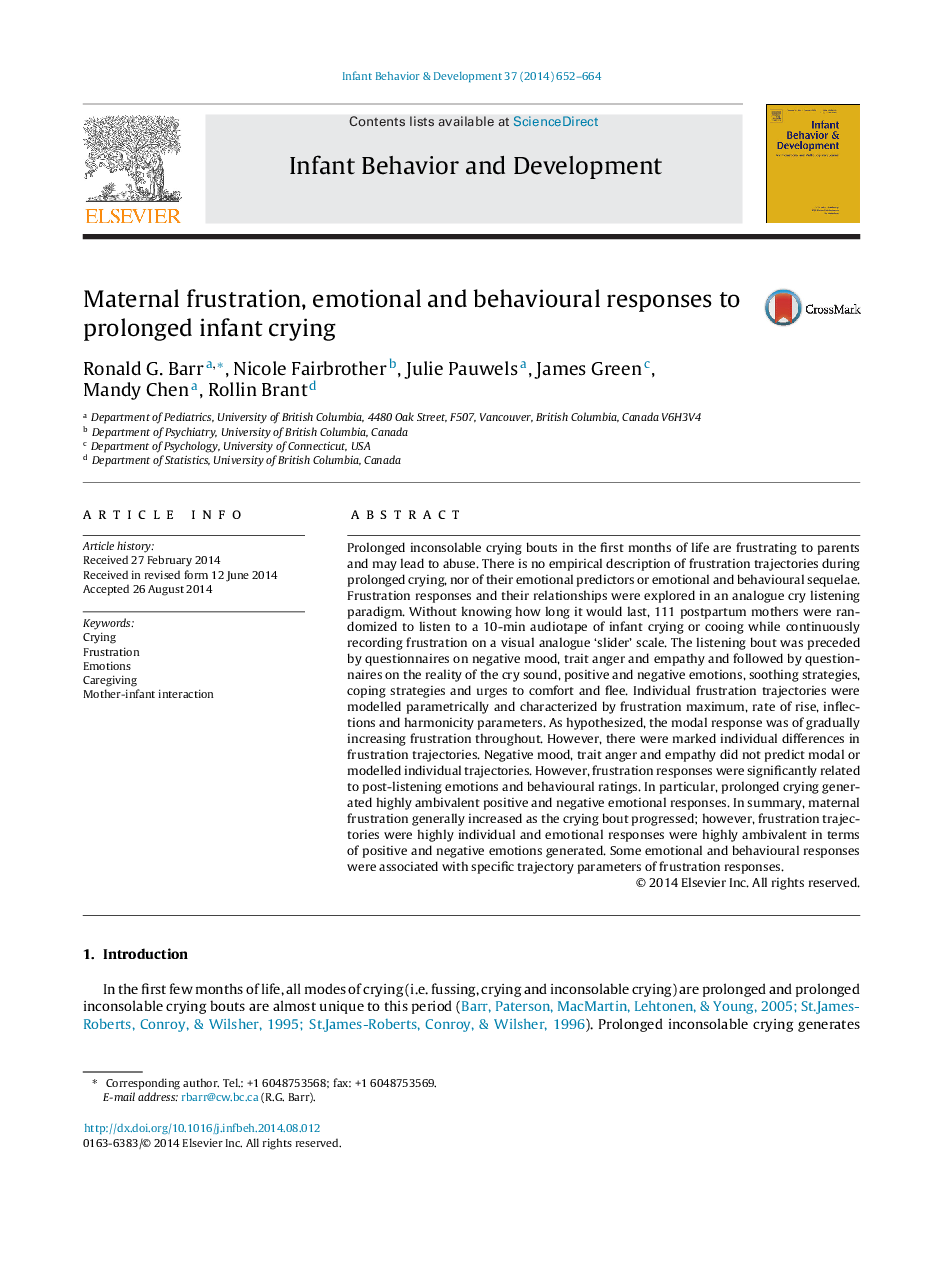| کد مقاله | کد نشریه | سال انتشار | مقاله انگلیسی | نسخه تمام متن |
|---|---|---|---|---|
| 10452633 | 919252 | 2014 | 13 صفحه PDF | دانلود رایگان |
عنوان انگلیسی مقاله ISI
Maternal frustration, emotional and behavioural responses to prolonged infant crying
ترجمه فارسی عنوان
سرخوردگی مادر، پاسخ های عاطفی و رفتاری به گریه نوزادان طولانی
دانلود مقاله + سفارش ترجمه
دانلود مقاله ISI انگلیسی
رایگان برای ایرانیان
کلمات کلیدی
گریان، نا امیدی، احساسات، مراقبت از مراقبت، تعامل مادر و نوزاد،
ترجمه چکیده
گریه های غیرقابل قبول طولانی مدت در اولین ماههای زندگی باعث ناراحتی والدین می شود و ممکن است منجر به سوء استفاده شود. هیچ توضیحی تجربی از مسیرهای ناامیدی در طول گریه طولانی، و نه پیش بینی های احساسی آنها و یا عواقب عاطفی و رفتاری وجود ندارد. پاسخ های ناامیدی و روابط آنها در پارادایم گوش دادن به گریه آنالوگ مورد بررسی قرار گرفت. بدون دانستن اینکه چه مدت طول خواهد کشید، 111 مادر پس از زایمان بهصورت تصادفی برای گوش دادن به صدای ضبط شده 10 دقیقه ای از گریه نوزاد یا سوزاندن در حالی که به طور مداوم ناامیدی در یک مقیاس «لغزنده» آنالوگ بصری گوش میدادند، تصادفی شدند. جلسه گوش دادن به وسیله پرسشنامه هایی درباره خلق و خوی منفی، عصبانیت و همدلی پیش می آید و به دنبال آن پرسشنامه هایی درباره واقعیت صدای گریه، احساسات مثبت و منفی، استراتژی های تسکین دهنده، استراتژی های مقابله ای و خواستار راحتی و فرار بودند. مسیرهای ناامیدی فردی به صورت پارامتریک مدل سازی شده و با حداکثر نا امیدی، نرخ افزایش، انفجار و پارامترهای هماهنگی مشخص می شود. به عنوان فرضیه، پاسخ مودال به تدریج باعث افزایش ناامیدی در سراسر کشور شد. با این حال، تفاوت های فردی در مسیرهای ناامیدی مشخص شده است. خلق و خوی منفی، عصبانیت و همدلی بودن، مسیرهای فردی یا مدل های منفرد را پیش بینی نمی کرد. با این حال، پاسخ های ناامیدانه به طور قابل توجهی با احساسات پس از گوش دادن و رأی های رفتاری ارتباط داشتند. به طور خاص، گریه طولانی مدت منجر به پاسخ های عاطفی مثبت و منفی شدید شد. به طور خلاصه، ناامیدی مادران به طور کلی به افزایش گریه گری افزایش یافت؛ با این حال، مسیرهای ناامیدی بسیار فردی بودند و پاسخ های هیجانی از لحاظ احساسات مثبت و منفی بسیار متضاد بودند. برخی از پاسخ های عاطفی و رفتاری با پارامترهای خاصی از پاسخ های ناامید مرتبط بودند.
موضوعات مرتبط
علوم زیستی و بیوفناوری
علم عصب شناسی
علوم اعصاب رفتاری
چکیده انگلیسی
Prolonged inconsolable crying bouts in the first months of life are frustrating to parents and may lead to abuse. There is no empirical description of frustration trajectories during prolonged crying, nor of their emotional predictors or emotional and behavioural sequelae. Frustration responses and their relationships were explored in an analogue cry listening paradigm. Without knowing how long it would last, 111 postpartum mothers were randomized to listen to a 10-min audiotape of infant crying or cooing while continuously recording frustration on a visual analogue 'slider' scale. The listening bout was preceded by questionnaires on negative mood, trait anger and empathy and followed by questionnaires on the reality of the cry sound, positive and negative emotions, soothing strategies, coping strategies and urges to comfort and flee. Individual frustration trajectories were modelled parametrically and characterized by frustration maximum, rate of rise, inflections and harmonicity parameters. As hypothesized, the modal response was of gradually increasing frustration throughout. However, there were marked individual differences in frustration trajectories. Negative mood, trait anger and empathy did not predict modal or modelled individual trajectories. However, frustration responses were significantly related to post-listening emotions and behavioural ratings. In particular, prolonged crying generated highly ambivalent positive and negative emotional responses. In summary, maternal frustration generally increased as the crying bout progressed; however, frustration trajectories were highly individual and emotional responses were highly ambivalent in terms of positive and negative emotions generated. Some emotional and behavioural responses were associated with specific trajectory parameters of frustration responses.
ناشر
Database: Elsevier - ScienceDirect (ساینس دایرکت)
Journal: Infant Behavior and Development - Volume 37, Issue 4, November 2014, Pages 652-664
Journal: Infant Behavior and Development - Volume 37, Issue 4, November 2014, Pages 652-664
نویسندگان
Ronald G. Barr, Nicole Fairbrother, Julie Pauwels, James Green, Mandy Chen, Rollin Brant,
